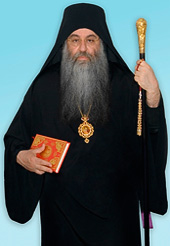Рассказ блаженной Феодоры
о мытарствах
У преп. Василия была послушница Феодора,
которая много служила ему; приняв иноческий чин, она отошла ко Господу. Одному из учеников преподобного, Григорию, пришло желание узнать, где находится по своем преставлении Феодора, сподобилась ли она от Господа милости и отрады за свое служение святому старцу. Часто размышляя об этом, Григорий просил старца ответить ему, что с Феодорой, ибо твердо верил, что угоднику Божию все это известно. Не желая огорчить своего духовного сына, преп. Василий помолился, чтобы Господь открыл ему участь блаженной Феодоры.
И вот Григорий увидел ее во сне – в светлой обители, полной небесной славы и неизреченных благ, которая была уготована Богом преп. Василию и в которой водворена была Феодора по его молитвам. Увидев ее, Григорий обрадовался и спросил ее, как разлучилась душа ее от тела, что она видела при своей кончине, как проходила воздушные мытарства. На эти вопросы Феодора отвечала ему так:
«Чадо Григорие, о страшном деле спросил ты, ужасно вспомнить о нем. Видела я лица, которых никогда не видела, и слышала слова, которых никогда не слыхала. Что я могу сказать тебе? Страшное и ужасное пришлось видеть и слышать за мои дела, но при помощи и по молитвам отца нашего преподобного Василия мне все было легко. Как передать тебе, чадо, ту муку телесную, тот страх и смятение, которое приходится испытывать умирающим! Как огонь сжигает брошенного в него и обращает в пепел, так мука смертная в последний час разрушает человека. Поистине страшна смерть подобных мне грешников! Итак, когда настал час разлучения души моей от тела, я увидела вокруг моей постели множество эфиопов, черных как сажа или смола, с горящими как уголья глазами. Они подняли шум и крик: одни ревели как скоты и звери, другие лаяли как собаки, иные выли как волки, а иные хрюкали как свиньи. Все они, смотря на меня неистовствовали, грозились, скрежетали зубами, как будто желая меня съесть; они готовили хартии, в которых были записаны все мои дурные дела. Тогда бедная душа моя пришла в трепет; муки смертной как будто не существовало для меня: грозное видение страшных эфиопов было для меня другою, более страшной смертью. Я отворачивала глаза, чтобы не видеть их ужасных лиц, но они были везде и отовсюду неслись их голоса. Когда я совершенно изнемогла, то увидела подходивших ко мне в образе красивых юношей двух Ангелов Божиих; лица их были светлы, глаза смотрели с любовью, волосы на голове были светлые как снег и блестели как золото; одежды были похожи на свет молнии, и на груди они были крестообразно подпоясаны золотыми поясами. Подошедши к моей постели, они стали около меня с правой стороны, тихо разговаривая между собой. Увидев их, я обрадовалась; черные же эфиопы затрепетали и отошли подальше; один из светлых юношей обратился к ним со следующими словами: «О бесстыдные, проклятые, мрачные и злые враги рода человеческого! Зачем вы всегда спешите придти к одру умирающих, производя шум, устрашаете и приводите в смятение каждую душу, разлучающуюся от тела? Но не радуйтесь очень, здесь вы ничего не найдете, ибо Бог милостив к ней и нет вам части и доли в этой душе». Выслушав это, эфиопы заметались, подняв сильный крик и говоря: «Как мы не имеем части в этой душе? А это грехи чьи,– говорили они, показывая на свитки, где были записаны все мои дурные дела,– не она ли сделала вот это и это?» И сказав это, они стояли и дожидались моей смерти. Наконец, пришла и сама смерть, рыкающая как лев и очень страшная по виду; она похожа была на человека, но только не имела никакого тела и была составлена из одних голых человеческих костей. При ней находились различные орудия для мучений: мечи, копья, стрелы, косы, пилы, топоры и другие неизвестные мне орудия. Затрепетала бедная душа моя, увидев это. Святые же Ангелы сказали смерти: что же медлишь, освободи эту душу от тела, освободи тихо и скоро, потому что за ней нет многих грехов. Повинуясь этому приказанию, смерть подошла ко мне, взяла малый оскорд и прежде всего отсекла мне ноги, потом руки, затем постепенно другими орудиями отсекла прочие члены мои, отделяя состав от состава, и все тело мое омертвело. Затем, взявши теслу, она отсекла мне голову, и она сделалась для меня как бы чужая, ибо я не могла ею повернуть. После этого смерть сделала в чаше какое-то питье и, поднеся к моим устам, насильно напоила меня. Питье это было так горько, что душа моя не могла этого вынести – она содрогнулась и выскочила из тела, как бы насильно вырванная из него. Тогда светлые Ангелы взяли ее себе на руки. Я обернулась назад и увидела свое тело лежащим бездушным, нечувственным и недвижным, подобно тому, как если кто снимет с себя одежду и, бросивши, смотрит на нее – так и я глядела на свое тело, от которого освободилась, и весьма удивлялась этому. Бесы, бывшие в образе эфиопов, обступили державших меня святых Ангелов и кричали, показывая мои грехи: «Душа эта имеет множество грехов, пусть даст нам за них ответ!» Но святые Ангелы стали отыскивать мои добрые дела и, по благодати Божией, находили и собирали все, что при помощи Господней сделано было мною доброго: милостыню ли я когда подала, или накормила голодного, или жаждущего напоила, или одела нагого, или ввела странника в дом свой и успокоила его, или услужила святым, или посетила больного и находящегося в темнице и помогла ему, или когда с усердием ходила в церковь и молилась с умилением и слезами, или когда со вниманием слушала церковное чтение и пение, или приносила в церковь ладан и свечи, или делала какое другое какое-либо приношение, или вливала деревянное масло в лампады перед святыми иконами и лобызала их с благоговением, или когда постилась и во все святые посты в среду и в пятницу не вкушала пищи, или сколько когда поклонов сделала и молилась по ночам, или когда всей душой обращалась к Богу и плакала о своих грехах, или когда с полным сердечным раскаянием исповедовала Богу перед своим духовным отцом свои грехи и старалась их загладить добрыми делами, или когда для ближнего сделала какое-нибудь добро, или когда не рассердилась на враждующего на меня, или когда перенесла какую-нибудь обиду и брань и не помнила их и не сердилась за них, или когда воздала добром за зло, или когда смиряла себя или сокрушалась о чужой беде, или сама была больна и безропотно терпела, или соболела другим больным, и утешила плачущего, или подала кому руку помощи, или помогла в добром деле, или удержала кого от дурного, или когда не обращала внимания на дела суетные, или удерживалась от напрасной клятвы или клеветы и пустословия, и все другие мои малейшие дела собирали святые Ангелы, готовясь положить против моих грехов. Эфиопы, видя это, скрежетали зубами, потому что хотели похитить меня у Ангелов и отвести на дно ада. В это время неожиданно явился там же преподобный отец наш Василий и сказал святым Ангелам: «Господие мои, эта душа много служила мне, успокаивая мою старость, и я молился Богу, и Он отдал ее мне». Сказав это, он вынул из-за пазухи золотой мешочек, весь полный, как я думала, чистым золотом, и отдал его святым Ангелам, сказав: «Когда будете проходить воздушными мытарствами и лукавые духи начнут истязывать эту душу, выкупайте ее этим из ее долгов; я по благодати Божией богат, потому что много сокровищ собрал себе своими трудами, и дарю этот мешочек душе, служившей мне». Сказавши это, он скрылся. Лукавые бесы, видя это, находились в недоумении и, поднявши плачевные вопли, тоже скрылись. Тогда угодник Божий Василий пришел снова и принес много сосудов с чистым маслом, дорогим миром и, открывая один за другим каждый сосуд, вылил все на меня, и от меня разлилось благоухание. Тогда я поняла, что изменилась и стала особенно светла. Святой же опять обратился к Ангелам со следующими словами: «Господие мои, когда вы совершите все, что нужно для этой души, отведите ее в уготованный мне Господом Богом дом и поселите ее там». Сказавши это, он сделался невидим, а святые Ангелы взяли меня, и мы по воздуху пошли на восток, поднимаясь к небу.
МЫТАРСТВО 1-е
Когда мы восходили от земли на высоту небесную, сначала нас встретили воздушные духи первого мытарства, на котором испытываются грехи празднословия. Здесь мы остановились. Нам вынесли множество свитков, где были записаны все слова, какие я только говорила от юности моей, все, что было сказано мною необдуманного и, тем более, срамного. Тут же были записаны все кощунственные дела моей молодости, а также случаи праздного смеха, к которому так склонна юность. Я видела тут же скверные слова, которые я когда-либо говорила, бесстыдные мирские песни, и обличали меня духи, указывая и место и время и лиц, с кем занималась я праздными беседами и своими словами прогневляя Бога, и нисколько не считала того за грех, а потому и не исповедовалась в этом перед духовным отцом. Глядя на эти свитки, я молчала будто лишенная дара речи, потому что мне нечего было им отвечать: все, что было у них записано, была правда. И я удивлялась, как это у них ничего не забыто, ведь прошло столько лет и я сама давно забыла об этом. Подробно и самым искусным образом испытывали они меня, и мало по малу я все вспомнила. Но святые Ангелы, водившие меня, положили конец моему испытанию на первом мытарстве: они покрыли грехи мои, указав лукавым на некоторые из бывших моих добрых дел, а чего не доставало из них на покрытие моих грехов, добавили из добродетелей отца моего преподобного Василия и искупили меня из первого мытарства, и мы пошли далее.








